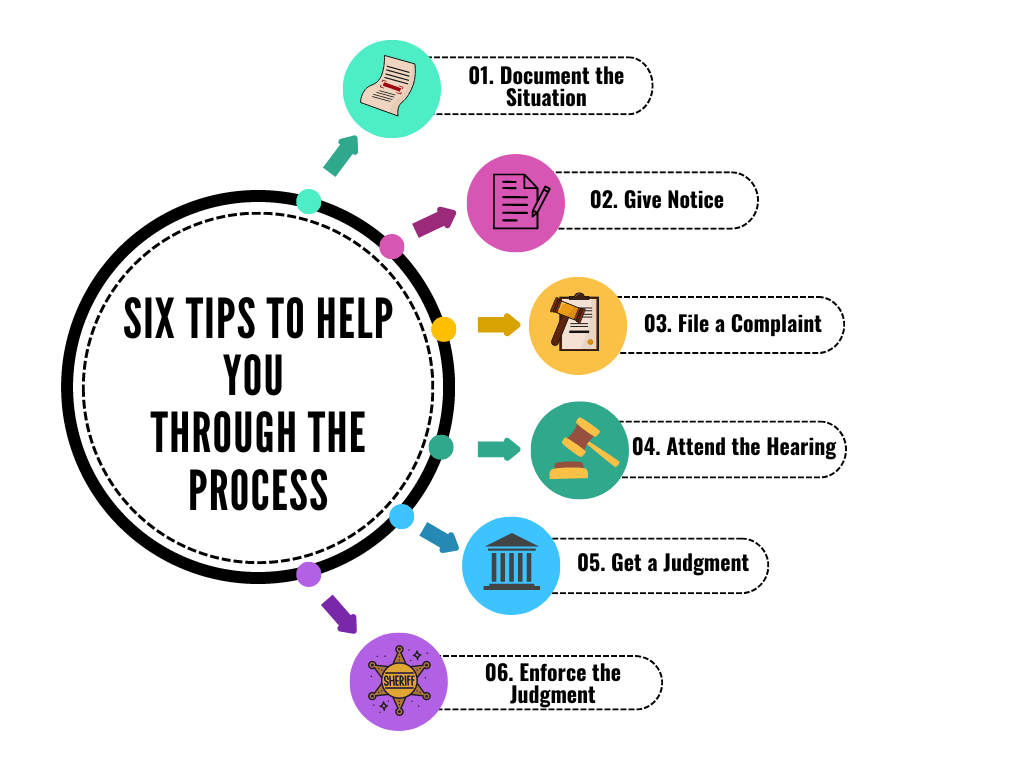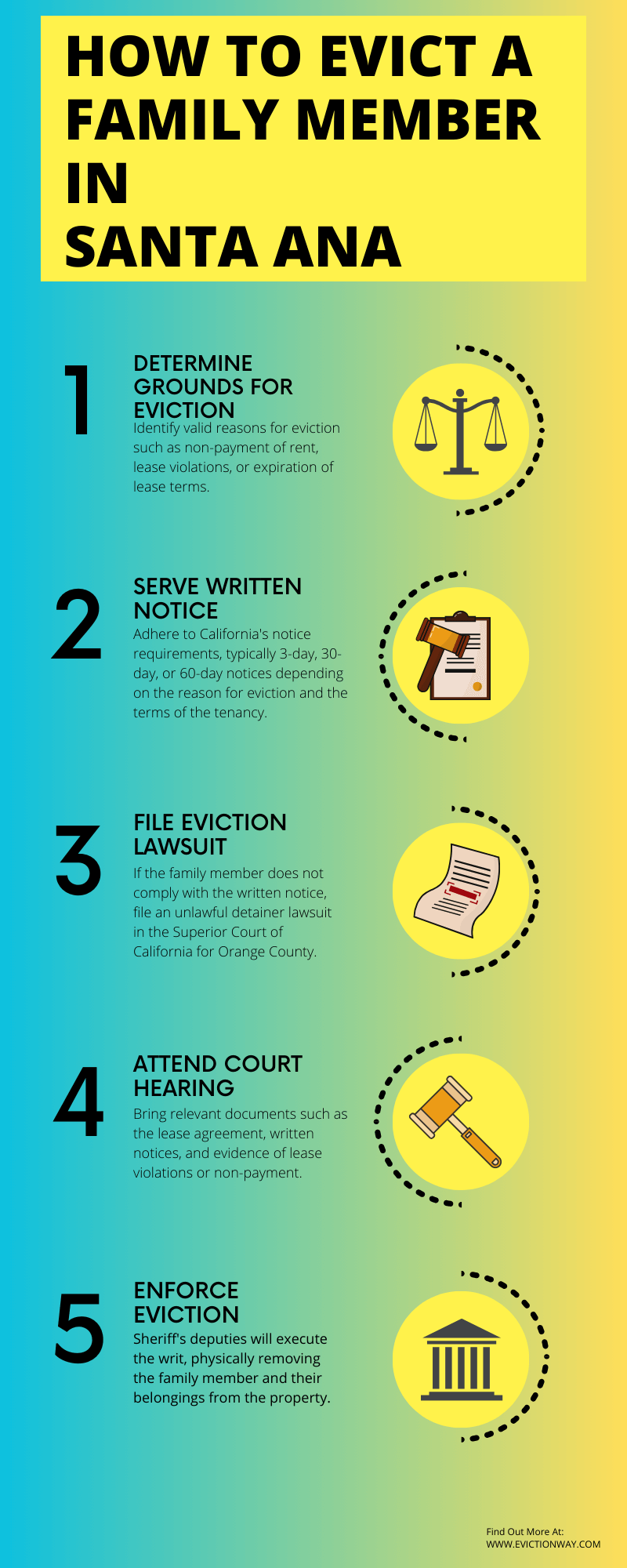Evicting a family member can be a difficult and emotional process, but it’s important to know your rights and the legal steps involved. In this article, we’ll provide a comprehensive guide on how to evict a family member in Santa Ana, California.
We’ll cover everything you need to know, from the legal grounds for eviction to the step-by-step process of filing and serving an eviction notice. We’ll also provide tips on how to remove a family member politely and respectfully, and we’ll discuss the legal implications of evicting a family member.
Whether you’re a landlord or a tenant, this article will provide you with the information you need to navigate the eviction process in Santa Ana. We’ll help you understand the laws involved, and we’ll provide legal tips to help you protect your rights.

How To Evict a Family Member In Santa Ana
Evicting a family member is never easy, but it may be necessary to protect your rights and property. If you’re considering evicting a family member in Santa Ana, here are six steps to help you through the process:
1. Document the Situation
Before you start the eviction process, it’s important to document the situation. This includes keeping a record of any rent payments that are late, any damage to the property, and any other issues that have led you to consider eviction.
2. Give Notice
Once you have documented the situation, you need to give your family member notice to vacate the property. The notice period will vary depending on the circumstances, but it’s generally 30 days.

3. File a Complaint
If your family member does not vacate the property after the notice period has expired, you will need to file a complaint with the court. The complaint should state the grounds for eviction and the amount of rent that is owed.
4. Attend the Hearing
Once you have filed a complaint, you will need to attend a hearing. At the hearing, you will present your evidence and your family member will have the opportunity to present their side of the story.
5. Get a Judgment
If the court finds in your favor, you will be granted a judgment for possession of the property. This judgment will give you the right to evict your family member.
6. Enforce the Judgment
Once you have a judgment, you can enforce it by having the sheriff evict your family member. This is a last resort, but it may be necessary to protect your rights.

How Much Does it Cost to Evict a Family Member in Santa Ana?
The cost of evicting a family member in Santa Ana can vary depending on the circumstances of the case. However, there are some general costs that you can expect to incur.
| Step in the Eviction Process | Estimated Cost Range | Additional Notes |
|---|---|---|
| Initial Legal Consultation | $100 – $435/hr | Some attorneys offer free consultations. |
| Notice to Vacate Preparation | $0 – $250 | If done by oneself or with the aid of an attorney. |
| Filing Fee for Eviction (Unlawful Detainer) | $240 – $435 | This range is for claims less than $10,000; above that, it’s higher. |
| Process Serving | $50 – $100 per attempt | Cost depends on the service method used. |
| Legal Representation for Court | $500 – $5,000+ | Cost varies with case complexity and attorney’s fees. |
| Sheriff or Police Eviction | $145 (or current Sheriff fee) | Fee for the Sheriff’s department to perform the eviction. |
| Locksmith Fees | $100 – $300 | To change or rekey locks after the eviction. |
| Post-Eviction Cleanup / Property Repairs | Varies | Depending on the damage or cleaning required. |
| Lost Rent | Varies | Based on monthly rent and length of the eviction process. |
- Filing fees: The filing fee for an eviction lawsuit in Santa Ana is $435.
- Service of process: The cost of serving the eviction notice to the tenant is typically between $50 and $100.
- Attorney fees: If you hire an attorney to represent you in the eviction process, you can expect to pay between $1,000 and $2,000.
- Court costs: If the case goes to trial, you may be responsible for paying court costs, such as the cost of a jury trial.
FAQs: Evicting a Family Member in Santa Ana
Here are some of the most frequently asked questions about evicting a family member in Santa Ana:
What are the legal grounds for evicting a family member in Santa Ana?
In Santa Ana, you can evict a family member if they have violated the terms of their tenancy, such as not paying rent or causing damage to the property. You can also evict a family member if they are engaging in illegal activities or if they are a danger to you or other tenants.
What is the process for evicting a family member in Santa Ana?
The process for evicting a family member in Santa Ana is similar to the process for evicting any other tenant. You must first give the family member a written notice to vacate the property. The notice must state the reason for the eviction and the date by which the family member must leave. If the family member does not leave by the deadline, you can file an eviction lawsuit with the court.
Can I evict a family member if they are not on the lease?
Yes, you can evict a family member even if they are not on the lease. However, you will need to prove that the family member is a tenant. You can do this by showing that the family member has been living in the property for a period of time, that they have been paying rent, or that they have been using the property as their primary residence.
How to serve an eviction notice in California?
In California, eviction notices must be served in person by a process server or sheriff, and the tenant must be given a copy. You can’t just mail it or slip it under the door. You must also file the notice with the court.
How long can you go without paying rent in California?
In California, you can generally go 30 days without paying rent before your landlord can start eviction proceedings.
What are some of the common defenses to eviction in Santa Ana?
Some of the common defenses to eviction in Santa Ana include:
- The family member is a minor.
- The family member has a disability.
- The family member is a victim of domestic violence.
- The eviction is retaliatory.
What should I do if I am being evicted by a family member?
If you are being evicted by a family member, you should seek legal advice immediately. An attorney can help you understand your rights and options, and can represent you in court if necessary.
Related:
How to Evict a Family Member in South Fulton
